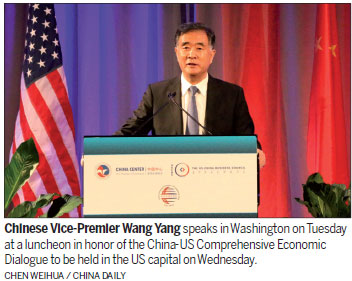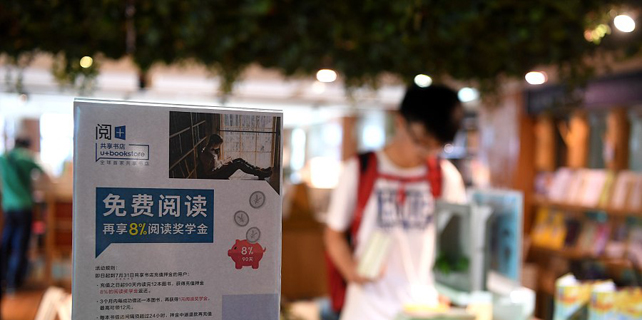Wang Yang calls for US tech exports to China

Chinese Vice-Premier Wang Yang on Tuesday urged the United States to loosen its "outdated" restrictions on high-tech exports to China so it can tap the vast Chinese market and reduce the bilateral trade imbalance.
Wang, who is in Washington to attend the China-US Comprehensive Economic Dialogue on Wednesday, said that as China upgrades its industries, there is a huge market for US exports of advanced technologies, key equipment and critical parts to China.
"Unfortunately, American businesses have not had their fair share of the 'cake' due to outdated US regulations on export control," he told a luncheon attended by US Treasury Secretary Steven Mnuchin and Commerce Secretary Wilbur Ross and hundreds of Chinese and US business leaders.
US high-tech exports to China accounted for 16.7 percent of China's total imports of such products in 2001, but that share plummeted to 8.2 percent in 2016.
Wang cited China's imports of integrated circuit (IC), which hit $227 billion last year, more than the importing of crude oil, iron ore and primary plastics combined. But only 4 percent of China's IC imports came from the US.
Wang, who is on his sixth trip to the United States in the last five years, cited a Carnegie Endowment for International Peace article that said that if the US were to liberalize its export barriers against China to the same level applicable to France, the US trade deficit with China would drop by up to 34 percent.
The demand for high-quality US products and services is growing fast, according to Wang. The US-China Business Council predicted that US goods and services exported to China will double to $369 billion in the coming decade and rise to $520 billion by 2050.
"China's development and progress is a long-term certainty, which offers the most important external environment for foreign businesses to work with China," Wang said.
"I am sure any business with vision would value such a huge market, and any government with ambition would value cooperation with China."
He also stressed that cooperation is the only right choice for the two countries, a message expressed by several senior Chinese leaders. "The giant ship of China-US economic and trade relations is sailing on the right course," Wang said.
Wang said China had undertaken to allow broader market access and greater opening of the services sector, such as leaving only 63 industries under restriction in the guidance catalogue for foreign investment, 117 fewer than the 2011 edition, down 65 percent.
Two US financial institutions have obtained licenses to conduct bond underwriting and settlement business in China's interbank bond market. "This is a result of the greater opening of China's financial sector," Wang said.
During the negotiations for the Bilateral Investment Treaty (BIT) conducted during the Obama administration, China had already agreed to further open up its banking, securities, insurance, telecommunication, cultural, internet and automobile sectors.
"There is no limit to the growth of the Chinese market, and China-US business cooperation holds out a promising future," Wang said.
He warned about the "Buy American, Hire American" pushed by US President Donald Trump's administration, saying that neither Chinese nor Americans can do without goods from the others' countries, given the depth of their business cooperation.
"As the world's two largest economies, the United States and China have strong overlapping interests and need to work together," said US Treasury Secretary Steven Mnuchin.
US Commerce Secretary Wilbur Ross described the US-China trade and investment relationship as "the most important in the entire world", saying "that relationship has brought benefits to both nations".
He applauded China's resumption of US beef imports after 14 years and described it as just a start.
"Our working relationship is better today than it has been in many decades," said Ross, who has conducted business in China for many years.
"Even now, [although] we occasionally disagree on individual items, we have fundamentally shared objectives. So I am very hopeful about the opportunities through further success," Ross said.
Serious concerns about a trade war between the two large countries based on Trump's tough campaign rhetoric have dissipated dramatically in the last few months, especially after the first summit between Trump and President Xi Jinping at the Mar-a-Lago resort in Palm Beach, Florida, in early April.
At Mar-a-Lago, the two sides established a four-track comprehensive dialogue mechanism and agreed to work on a 100-Day Action Plan, which was due on July 16. Both sides have so far spoken positively of the progress made within a relatively short period of time.
chenweihua@chinadailyusa.com









